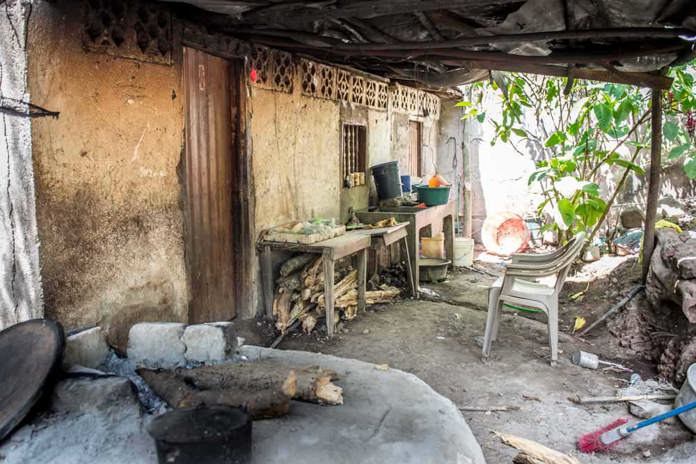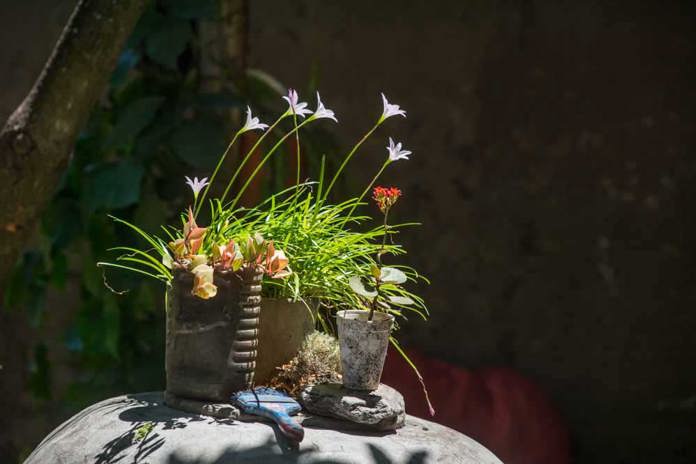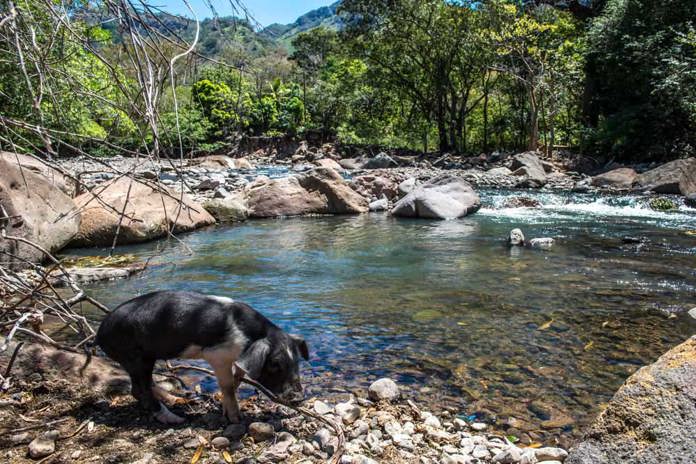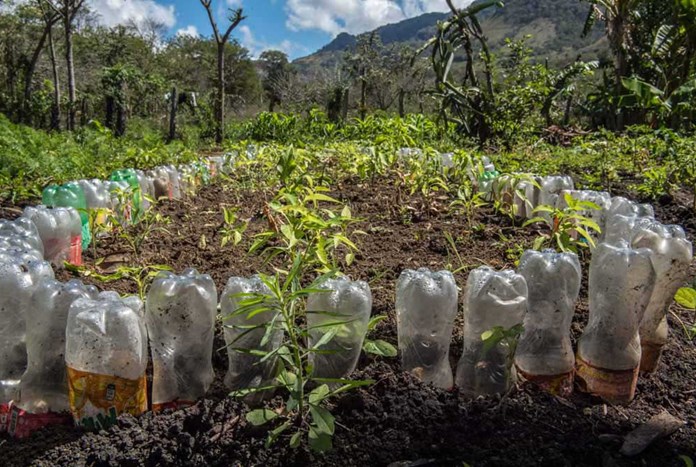18-year-old Millie Rose, who first visited Nicaragua in 2015, is spending 4 months working in CEPAD’s office before starting an International Development course at Portsmouth University. We asked her to share a little about her impressions of CEPAD’s work — particularly after the recent flooding and the political situation.
Recycled plastic bottles used as drip-feed irrigation systems in Rosa’s garden, La Concepción.
Recently, parts of Nicaragua suffered from severe flooding. During this time I spoke to a farmer involved in CEPAD’s family garden program.
She explained that she was lucky because her house and plot are at the top of a hill so the flooding from the nearby river hadn’t affected her much but she knew other people living in the same community who hadn’t been so lucky, and all of their produce, almost ready to be harvested, had been destroyed.
This produce would have been used to feed entire families, with the remaining yield being sold as family income; but now they must work to regrow their crops and adapt for next year. Note: CEPAD is providing emergency food parcels to those affected and Amos Trust is supporting them in this.
...but she knew other people living in the same community who hadn’t been so lucky, and all of their produce, almost ready to be harvested, had been destroyed.”
A few weeks later CEPAD held its National Forum of Rural Development where 38 local farmers across Nicaragua, working with CEPAD, gathered together to share different agricultural techniques. When we hear, every day, of another story of how climate change is destroying our planet, I was humbled as I listened to how to create a drip irrigation system from a plastic Coca Cola bottle. It showed me how rural communities are challenging climate change by demanding a better world for their children.

Image: Home.
While seeing such determination to find solutions like this, I was reminded of something one of our Palestinian partners Dr Abdelfattah Abusrour said, “We don’t wait for miracles — we provoke them.”
As a response to an Amos Trust supporter trip to Nicaragua in the spring of 2018, Amos has now helped to provide 140 water filters for the region of Tuestepe. I recently visited a lady’s home, who is one of the benefactors of the water filters.
Whilst there I had roasted sweet pumpkin cooked for me using the produce from her plot. She proudly showed me how the dish had been made using the water filter and explained how she and her family now use the filter for almost everything.
The importance of these water filters was made even more apparent to me when we left the village. As we drove down the road in a 4x4 truck (it’s impossible to access these communities without a 4x4, and sometimes not even possible then), the driver pointed to the cemetery on the side of the road and told me how the majority of people who lay in this cemetery had died due to an illness caught through drinking the water from the local river. Yet now this problem has been almost eradicated due to the water filters.
Whilst there I had roasted sweet pumpkin cooked for me using the produce from her plot. She proudly showed me how the dish had been made using the water filter and explained how she and her family now use the filter for almost everything.”
From April to July of 2018, Nicaragua saw severe political unrest. While the country still remains much-divided over the events since April, one thing that was clear to me over Christmas was that Nicaragua was “en luto” — in mourning. The government meanwhile wanting to go 'back to normal' covered the capital city, Managua, in a million Christmas lights and put up giant, light-up angels all along the main road leading down to Lake Managua.

Image: Every blossoming plant is a sign of hope in Teustepe — an area deeply affected by climate change.
While people are able to perform their daily routines, the results of the crisis are still so present in the lives of Nicaraguans and each day you will find government employees standing at the main roundabouts waving FSLN (Sandinista National Liberation Front) flags.
From April to July, (the worst period of the crisis), thousands of Nicaraguans fled to Costa Rica, leaving the Costa Rican immigration department overwhelmed and unable to cope. I have heard horrific tales of violence and human rights abuses on both sides and every time I think I have a better idea of the crisis, I find myself hearing someone else’s experience and only have more questions.
One thing that is certain though, everyone you ask will have been affected by the crisis in some way. Even if they themselves weren’t directly affected they will know of someone that had to flee the country, is in jail or was killed because of the events over those 3 months. It feels like a time when people are just starting to talk about the violence and trauma of those 3 months and come to terms with everything that happened.
From April to July, (the worst period of the crisis), thousands of Nicaraguans fled to Costa Rica, leaving the Costa Rican immigration department overwhelmed and unable to cope.”
The problem was that for each generation the crisis meant something different. For those who still have very real memories of the civil and contra wars, this was a harrowing reminder of those past horrors. However, for young people just discovering their political voice, they felt that this was the moment to stand up for what they believe in.

Image: After months without rain, Nicaragua experiences a year's annual rainfall in 2 days, leading to rivers bursting their banks and flooding.
This was evident by a large number of students involved in the protests with the majority being from UCA (the University of Central America, a private university in Managua). These young people experienced some of the worst that the crisis brought by losing their lives or having to flee the country.
The distress experienced by people has resulted in CEPAD launching a trauma response program to train pastors and young people to be able to respond and help those trying to cope with what they’ve experienced, as well as how to address those same feelings in their own lives.
Psychologists working with CEPAD run work-shops using engaging interactive methods to discuss and process those traumatic events. I sat in on a training session for pastors, which was incredibly humbling — to see people with contradictory views, recognising that the need to heal and restore comes before any political agenda.
— — — — — — —
Find out more about Amos’ Water For life appeal



















